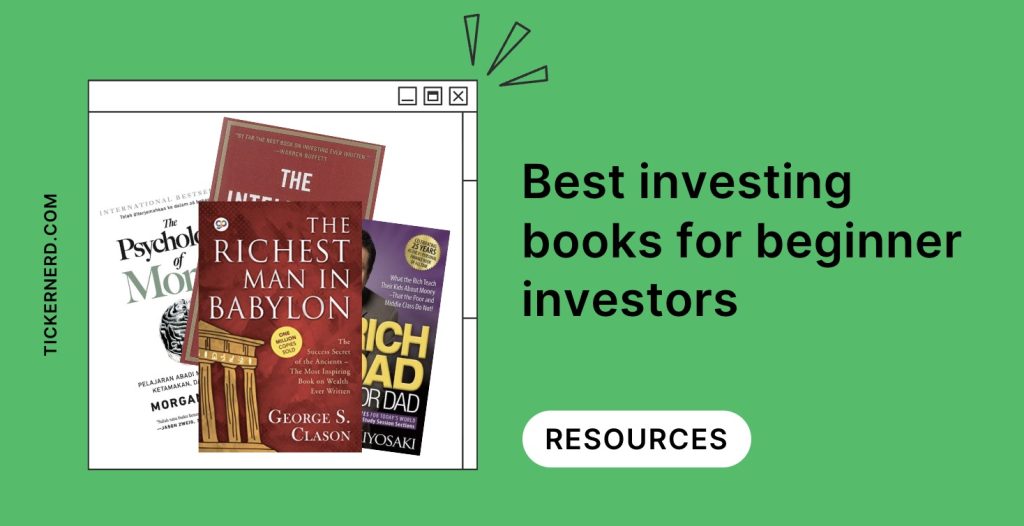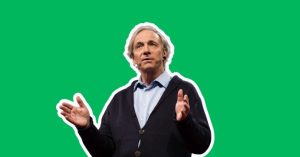If you’re like me then you probably feel overwhelmed diving into the world of investing.
The jargon, strategies, and countless theories can seem like a maze.
But the good news is that I’m here to help you.
Over the years, I've read numerous books, and today, I want to share my curated list with you.
These are not just random picks; they are the crème de la crème of investing literature, perfect for someone taking their first steps. You’ll find books on general investing principles, the stock market, day trading, real estate investing, and even cryptocurrency.
The best investing books to read this year if you’re a beginner
1. The Intelligent Investor by Benjamin Graham
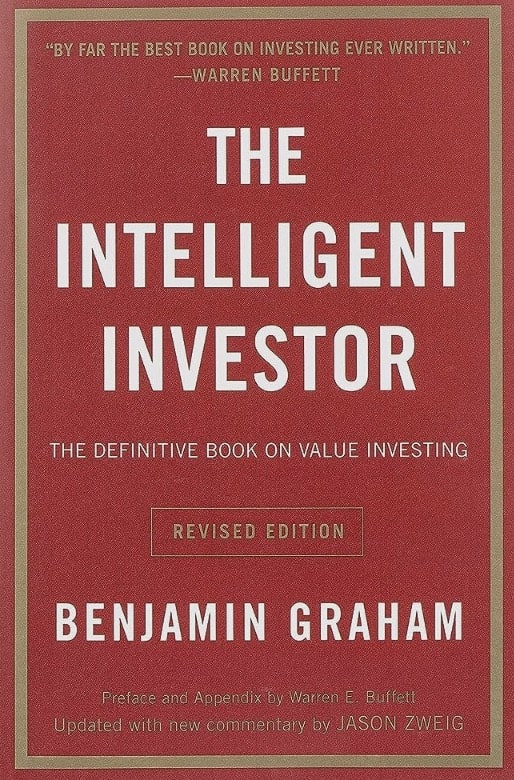
Benjamin Graham, often labeled the ‘father of value investing’, was an economist, professor, and financial analyst. His philosophies on investing have influenced some of the world's top investors, including Warren Buffett. The Intelligent Investor is a timeless classic full of value investing principles. Graham emphasizes the importance of analyzing and understanding a company's long-term fundamentals rather than short-term market fluctuations.
“An investment operation is one which, upon thorough analysis, promises safety of principal and an adequate return. Operations not meeting these requirements are speculative.”
Benjamin Graham
Graham introduces the concept of ‘Mr. Market’ to illustrate the erratic behavior of the stock market and to teach investors to remain rational and disciplined. By adhering to Graham's strategies, we can make sound decisions and grow our wealth over time. It’s important to remember that you’re investing in a company not just a volatile stock symbol.
2. Rich Dad Poor Dad by Robert T. Kiyosaki
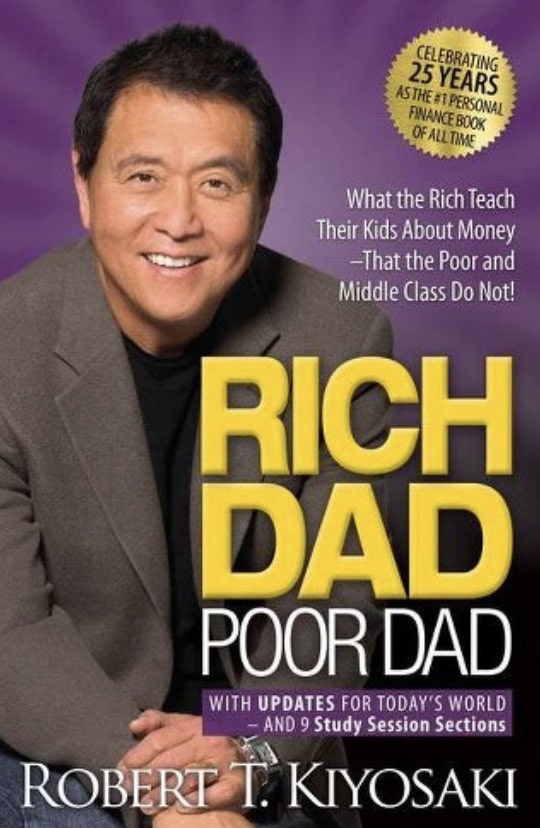
Robert T. Kiyosaki is a famous entrepreneur, educator, and author best known for his book Rich Dad Poor Dad. According to Wikipedia, there have been over 30 million copies sold. Kiyosaki’s teachings challenge traditional beliefs about money, investing, and life, inspiring millions to pursue financial freedom.
“Winners are not afraid of losing. But losers are. Failure is part of the process of success. People who avoid failure also avoid success.”
Robert T. Kiyosaki
The book delves into the fundamental differences between the mindsets of the wealthy and the poor (and even the middle class). Using the contrasting advice from his ‘Rich Dad’ (his friend's father) and his biological ‘Poor Dad’, Kiyosaki highlights the importance of financial education and building assets over liabilities. This is one of the best books beginners can start with since it will help you nail the foundations of investing.
3. The Little Book of Common Sense Investing by John C. Bogle
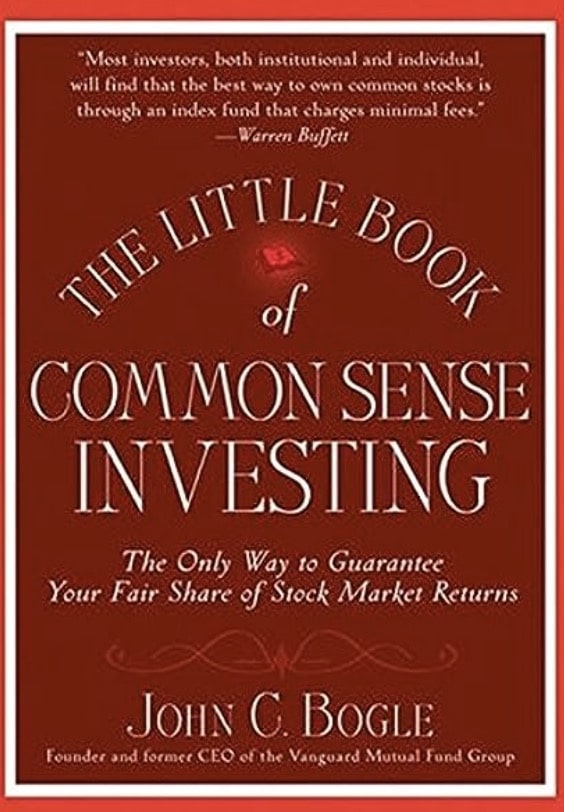
John C. Bogle was the founder of Vanguard Group and a pioneer in the creation of low-cost index funds for individual investors. Index funds have taken the world by storm and have become a stable investment for millions (if not billions) of people. The Little Book of Common Sense Investing offers a compelling case for the value of low-cost index funds over pricier, actively managed funds. Bogle suggests that capturing the full returns of the broader market, minus minimal fees, is more effective than attempting to beat the market. This is very similar to the popular phrase ‘time in the market over timing the market’.
“Don't look for the needle in the haystack. Just buy the haystack!”
John C. Bogle
The moral of the story is that we should consider simple, long-term focussed investments, and avoid excessive costs when investing. It's a must-read for anyone looking to understand the principles of passive investing and the power of compound interest.
4. A Random Walk Down Wall Street by Burton G. Malkiel
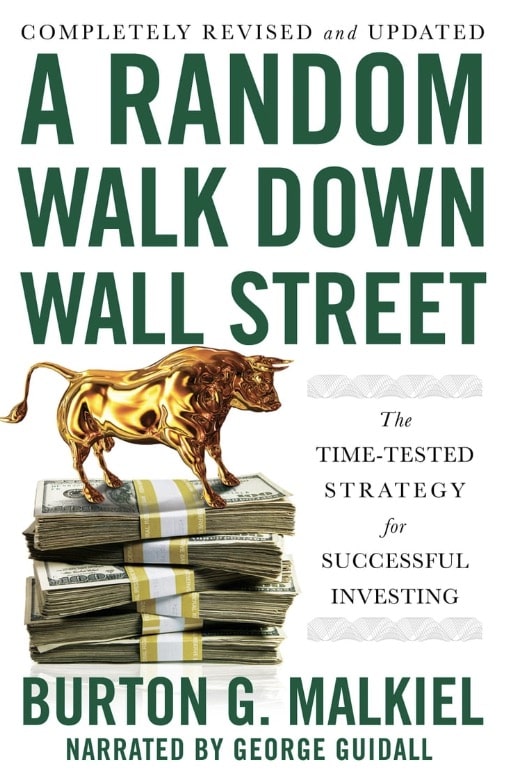
Burton G. Malkiel is a renowned economist and writer, best known for his classic book A Random Walk Down Wall Street which challenges conventional investment strategies. Malkiel was a strong advocate for the efficient market hypothesis, which states that asset prices reflect all available information (making it impossible to beat the market consistently).
“It is not hard to make money in the market. What is hard to avoid is the alluring temptation to throw your money away on short, get-rich-quick speculative binges. It is an obvious lesson, but one frequently ignored.”
Burton G. Malkiel
Malkiel argues that no one can consistently predict market changes, making stock picking largely unfruitful. Although, I disagree with this to some degree Malkiel has a point. However, the book covers a range of investment strategies and the history of their performances. Similar to John C. Bogle of Vanguard, Malkiel concludes that a low-cost, broad-based index fund is often the most sensible choice for most investors.
5. The Psychology of Money by Morgan Housel
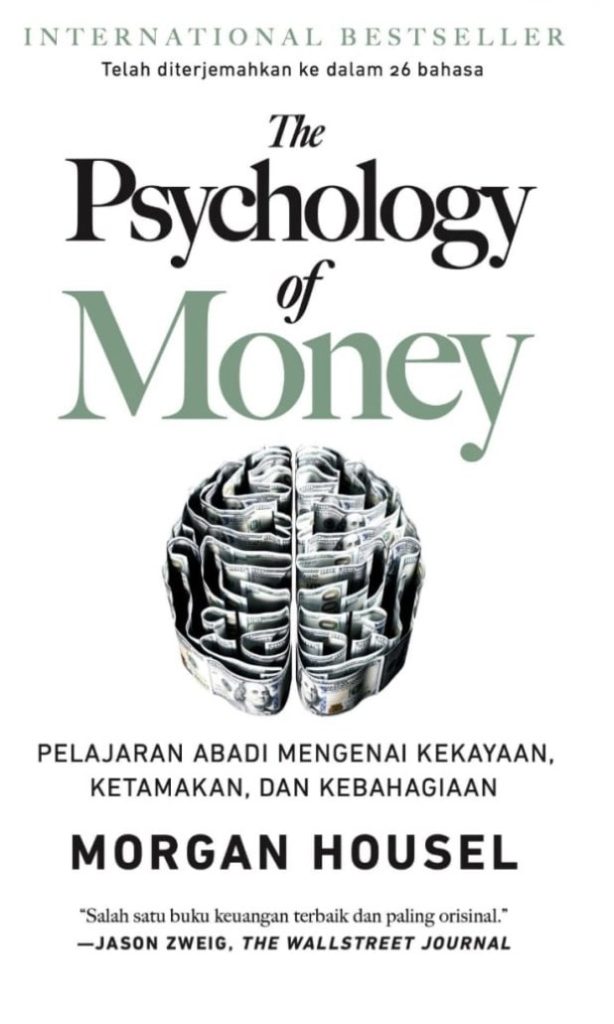
I’ve read this book numerous times and I’m confident all beginner investors will love it. Morgan Housel is a distinguished financial writer and partner at The Collaborative Fund. He’s known for his ability to intertwine human psychology with finance. With a deep understanding of behavioral economics, Housel teaches us how emotions and perspectives influence our financial choices.
“Spending money to show people how much money you have is the fastest way to have less money.”
Morgan Housel
One thing I noticed is that the book stresses the importance of self-awareness, adaptability, and long-term thinking in financial success. In other words, chasing quick profits is a fool's errand. I found it to be a refreshing take on wealth since it offered a deeper analysis of what truly matters in the world of money. If you’re just starting your investing journey and you want to build a healthy mindset around money then I suggest reading this.
6. The Richest Man in Babylon by George Samuel Clason
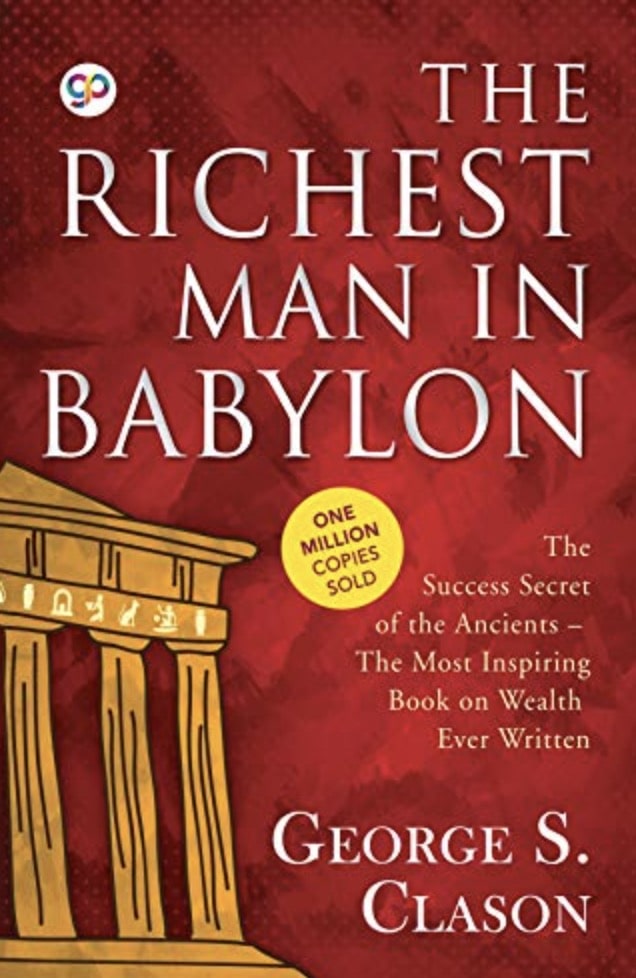
This is another timeless classic I’ve read numerous times, especially since it was a short read. George Samuel Clason was a prolific writer and businessman, best known for his classic financial literature set in ancient times. His parables have educated generations on the basics of wealth-building and financial discipline. The Richest Man in Babylon provides timeless financial wisdom through a series of captivating parables set in ancient Babylon. So be warned, it’s not your standard investing book.
“Advice is one thing that is freely given away, but watch that you only take what is worth having.”
George Samuel Clason
You will learn fundamental principles such as living below your means, investing wisely, and seeking knowledge to increase your earning potential. Through tales of merchants, money lenders, and the wealthy elite of Babylon, the book emphasizes the importance of disciplined saving, prudent investing, and continuous learning. This book is a perfect primer for anyone, regardless of age or financial background.
7. The Bitcoin Standard: The Decentralized Alternative to Central Banking by Saifedean Ammous
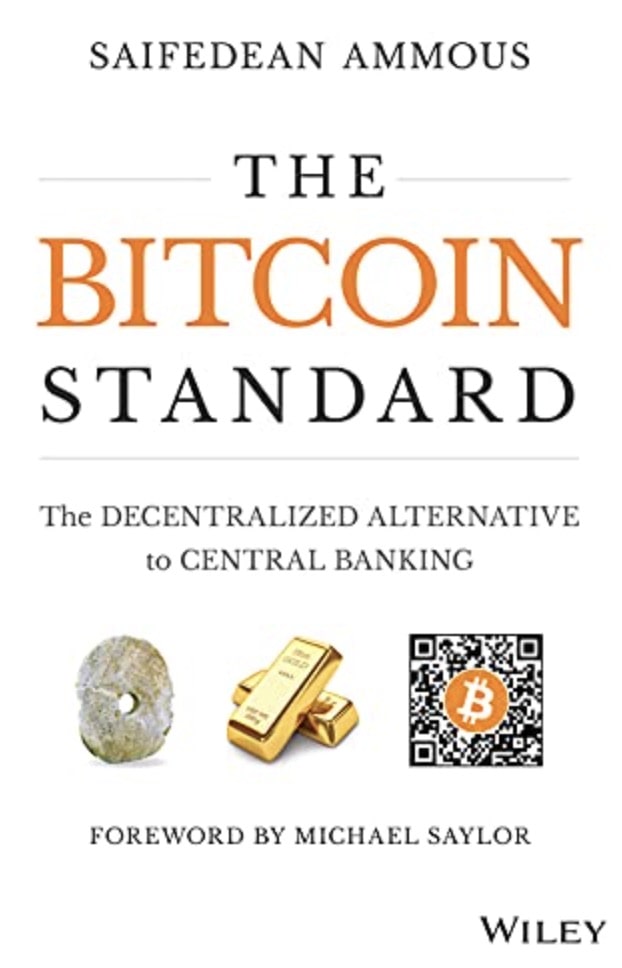
Cryptocurrency has taken the world by storm, especially given the current economic environment with interest rates and inflation. So it makes sense for a beginner investor to learn why Cryptocurrency (in particular Bitcoin) is so popular. In The Bitcoin Standard, Ammous delves into the historical, economic, and social underpinnings of Bitcoin and how it presents a viable alternative to traditional central banking systems. I will note that this book is slightly more technical but it’s still a great read.
“money that is easy to produce is no money at all, and easy money does not make a society richer; on the contrary, it makes it poorer by placing all its hard‐earned wealth for sale in exchange for something easy to produce.”
Saifedean Ammous
Ammous argues that Bitcoin's limited supply and decentralized nature offer a solution to the inflationary policies of contemporary banks. The book then highlights cryptocurrency's role in ushering in a new era of sound money and financial stability. This wouldn’t be my first recommendation but if you’re curious about cryptocurrency it's a great starting point.
8. The Millionaire Real Estate Investor by Jay Papasan and Gary Keller
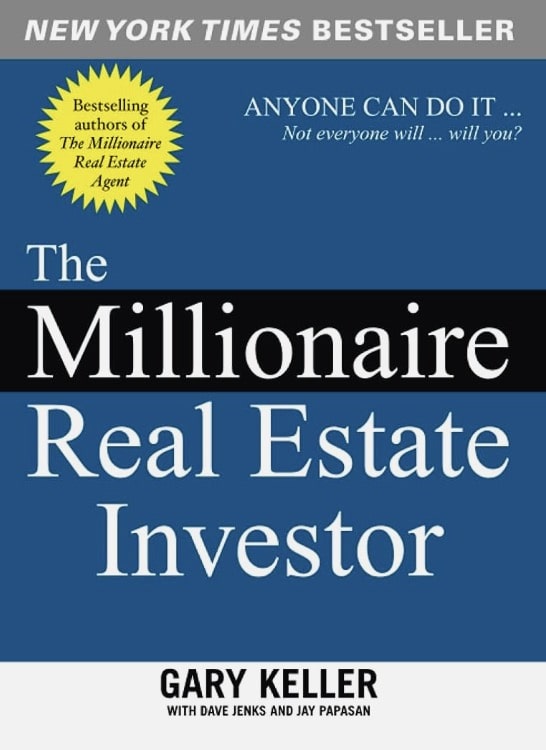
Did you know that 90% of all millionaires in the United States become so through owning real estate? Pretty compelling right? The only downside is that real estate is expensive, but don’t let this stop you. The Millionaire Real Estate Investor dives into the strategies and insights shared by successful real estate investors. The book is co-authored by Jay Papasan, who has published several best-selling books in this space. The other co-author, Gary Keller, is the founder of Keller Williams Real Estate, the largest real estate company in the United States. So it’s safe to say this is one of the best books you could find on real estate investing.
“Money has its own rules and disciplines, and it doesn’t care who you are. If you break its rules, it’ll break you. In other words, when you break money’s rules, you’re broke. Don’t be financially illiterate. Learn the rules and enjoy the rewards. It’s your life. Money doesn’t care about it one way or another, but you do.”
Jay Papasan and Gary Keller
Through real-life examples, The Millionaire Real Estate Investor highlights the importance of mindset, networking, and financial know-how in the world of real estate investing. Both novice and seasoned investors can gain valuable insights from the experiences and wisdom of those who have achieved millionaire status in the property market.
9. The Essays of Warren Buffett: Lessons for Corporate America by Warren E. Buffet and Lawrence A. Cunningham
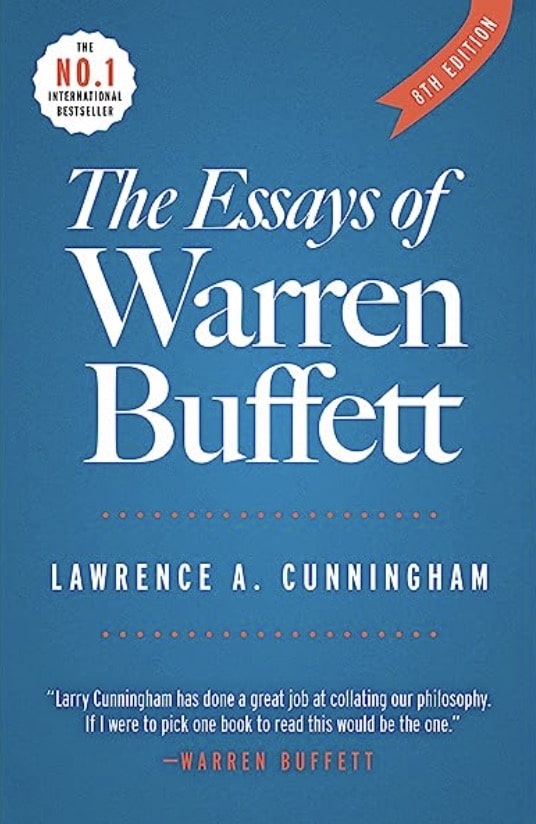
Even if you’re new to investing you probably know who Warren Buffet is. But for those who don't, he’s the chairman and CEO of Berkshire Hathaway and is universally regarded as one of the most successful investors of all time. Known for his value investing approach and unmatched track record, The Essays of Warren Buffet is a book you don’t want to ignore.
“A horse that can count to ten is a remarkable horse—not a remarkable mathematician.”
Warren E. Buffet
Buffet has a no-bullsh*t approach to business and investing which makes his books easy to read. In this particular book, Buffet distills his investment wisdom, insights into corporate governance, and views on management. With a focus on long-term value creation, integrity, and the importance of a shareholder-friendly approach, the book serves as an invaluable guide for business leaders and investors alike. You’re literally getting decades of practical wisdom from one of the most successful investors in history. For this reason, I recommend every new investor add it to their collection.
10. Principles by Ray Dalio
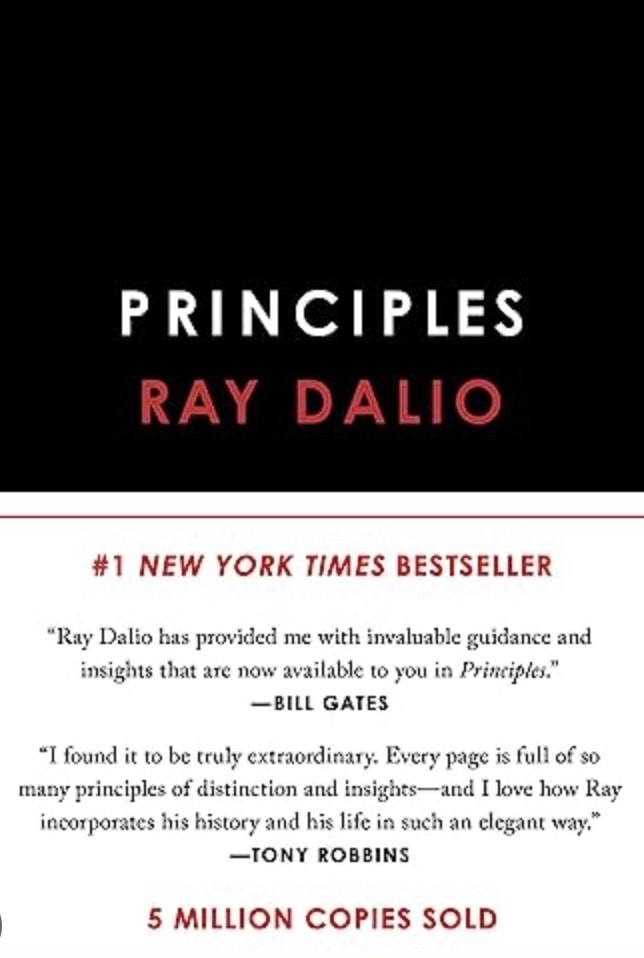
Ray Dalio is one of my favorite investors, I’ve read Principles twice and I frequently watch his Youtube videos on investing. Ray Dalio is the founder of Bridgewater Associates, one of the world's most successful hedge funds. He’s also considered one of the top investment thinkers in modern history. Beyond his financial acumen and accolades, Dalio is recognized for his deep reflections on life, decision-making, and the mechanics of achieving personal and organizational success.
“If you’re not failing, you’re not pushing your limits, and if you’re not pushing your limits, you’re not maximizing your potential”
Ray Dalio
Dalio divides the book into Life and Work principles, emphasizing the value of radical transparency, meritocracy, and thoughtful decision-making. By combining lessons from his career with his unique approach to life, Dalio provides readers with tools to achieve better outcomes in both personal and professional domains. I think it's a masterclass in navigating complex challenges, making decisions, and building a successful, purpose-driven life. Anyone at any stage of their investing journey or life journey will find Principles an invaluable resource.
11. The Barefoot Investor by Scott Pape
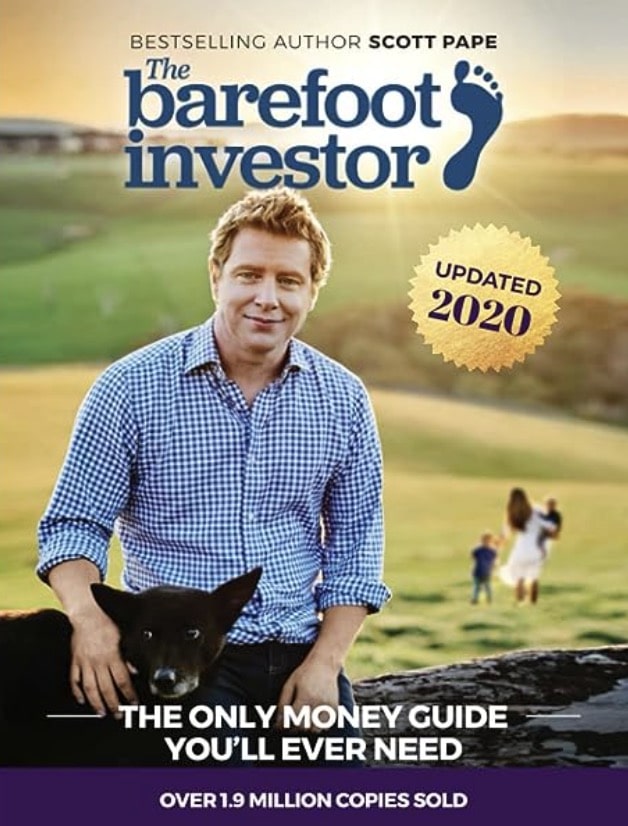
According to the Guardian, 1 in 20 Australian households have a copy of The Barefoot Investor. This speaks volumes about the quality packed into the book. Scott Pape is an acclaimed Australian financial advisor, author, and television host, widely known for his no-nonsense approach to personal finance. His work, particularly The Barefoot Investor, has earned him a reputation as one of the most trusted voices in financial guidance in Australia. But even if you’re not an Aussie you should check out Pape’s systems and philosophies.
“Success isn’t found in the eyes of others: buying things you don’t need, with money you don’t have, to impress people you won’t know in 20 years’ time.”
Scott Pape
Pepe teaches his famous ‘serviette strategy’ and suggests we should structure our income into three buckets: blow, mojo, and grow. From here we’re urged to open five separate bank accounts (which I actually did). The book goes into more detail about why this is important so if you’re interested in improving your personal finances along with learning how to invest appropriately I recommend giving this a read.
12. I Will Teach You To Be Rich by Ramit Sethi
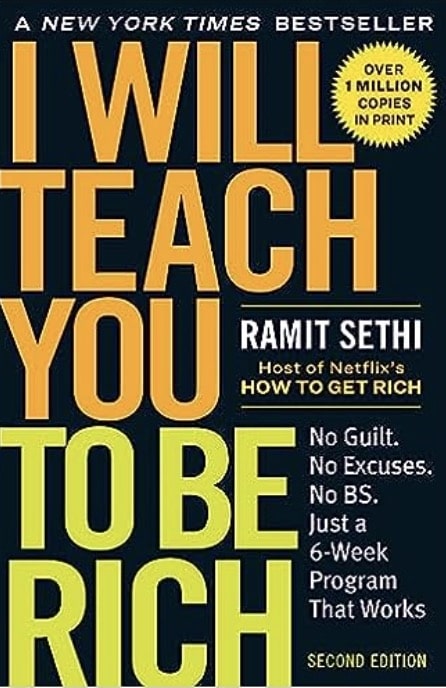
Ramit Sethi is a best-selling author, entrepreneur, and financial advisor renowned for his modern approach to personal finance. You might even recognize his name from the new Netflix series ‘How to Get Rich'. Although in this book I Will Teach You To Be Rich, Sethi offers a comprehensive six-week program aimed at young adults wanting to master their finances (that’s me ????).
“The 85 Percent Solution: Getting started is more important than becoming an expert.”
Ramit Sethi
Sethi also combines insights from psychology and personal finance to provide actionable steps for optimizing spending, saving, and investing. With his approach, you can continue spending on what you love while cutting costs elsewhere. Sethi will also teach you how to automate smart behaviors to ensure consistent financial growth. Young adults and anyone seeking a no-nonsense, actionable roadmap to financial success will find this book to be refreshing and helpful.
13. Think and Grow Rich by Napoleon Hill
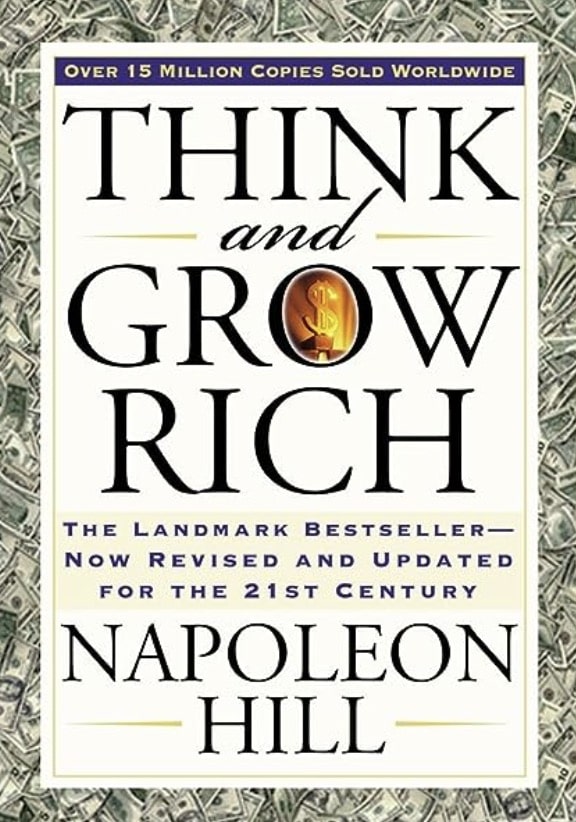
Napoleon Hill was an American self-help author and motivational speaker of the 20th century. His work and research have left a lasting impact on personal development literature. This formed the foundation for Think and Grow Rich, one of the best-selling books of all time. Drawing from his interviews with immensely successful individuals, including Andrew Carnegie and Thomas Edison, Hill outlines 13 key principles that are fundamental to achieving personal and professional goals.
“The starting point of all achievement is DESIRE. Keep this constantly in mind. Weak desire brings weak results, just as a small fire makes a small amount of heat.”
Napoleon Hill
The book emphasizes the power of desire, faith, and persistence while highlighting the importance of positive thinking and proactive behavior. It offers readers a blueprint for turning their ambitions into reality, underpinned by actionable strategies and a deep understanding of human potential.
14. The Four Pillars of Investing: Lessons for Building a Winning Portfolio by William J. Bernstein
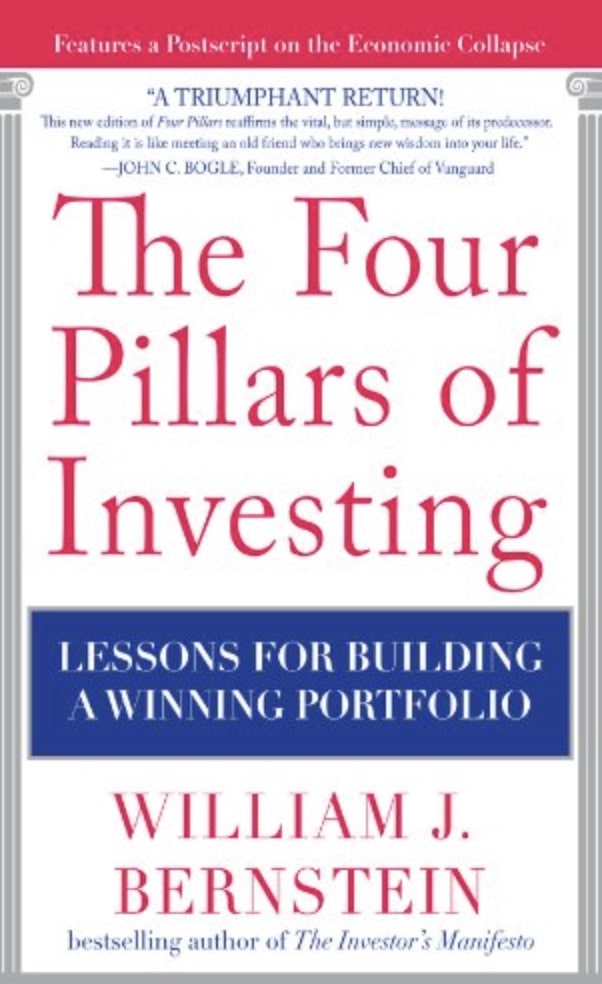
William J. Bernstein is a prominent financial theorist and historian with deep-rooted expertise in modern portfolio theory. What’s interesting about Bertsein is that he was initially trained as a neurologist, but transitioned to finance. As a result, he published several influential books, cementing his status as a thought leader in the investment world. In The Four Pillars of Investing: Lessons for Building a Winning Portfolio Bernstein delves into the intricate relationship between the following:
- Investment theory
- History
- Psychology
- Business elements that influence the market
“If your portfolio risk exceeds your tolerance for loss, there is a high likelihood that you will abandon your plan when the going gets rough.”
William J. Bernstein
By synthesizing these four key pillars, he provides readers with a holistic understanding of how markets work and how to make informed investment decisions. The book stands as a beacon for both novice and experienced investors, offering insights into avoiding common pitfalls and building long-term wealth.
15. The Millionaire Next Door: The Surprising Secrets of America's Wealthy by Thomas J. Stanley
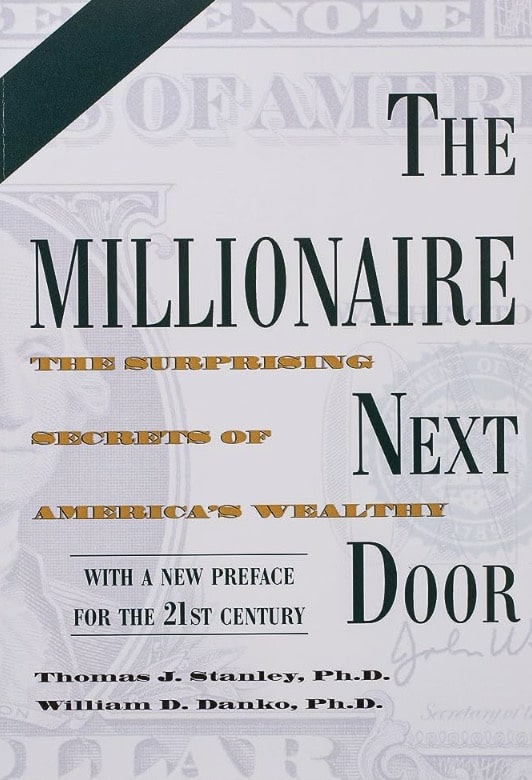
If you’re like me then you probably held false beliefs about the wealthy. The Millionaire Next Door offers an analysis of the habits and lifestyles of the truly wealthy in America, debunking common myths about millionaires. The authors reveal that most genuine millionaires live below their means, prioritize financial independence, and consistently follow practices of budgeting and frugality. This isn’t just guesswork. Through extensive surveys and research, the book highlights that the path to wealth often involves discipline, hard work, and living a modest lifestyle.
“I am not impressed with what people own. But I’m impressed with what they achieve. I’m proud to be a physician. Always strive to be the best in your field…. Don’t chase money. If you are the best in your field, money will find you.”
Thomas J. Stanley
This book will challenge your fundamental beliefs and your idea of the typical millionaire. Either way, it’s a great read and will certainly set you up for long-term wealth and success.
Other investing books worth mentioning
- Easy Money: Cryptocurrency, Casino Capitalism, and the Golden Age of Fraud by Ben McKenzie and Jacob Silverman
- Just Keep Buying: Proven ways to save money and build your wealth by Nick Maggiulli
- Stock Trader's Almanac 2023 by Jeffrey Hirsch
- Buy, Rehab, Rent, Refinance, Repeat: The BRRRR Rental Property Investment Strategy Made Simple by David M Greene (this is one of my personal favorites for real estate investing ????????)
- Poor Charlie's Almanack: The Wit and Wisdom of Charles T. Munger, Expanded Third Edition by Charlie Munger
Frequently asked questions
This will depend on your level of knowledge. If you’re a complete beginner then I recommend starting with Rich Dad Poor Dad by Robert T. Kiyosaki. For those with a little more experience and knowledge then The Essays of Warren Buffett: Lessons for Corporate America by Warren E. Buffet and Lawrence A. Cunningham is a great read.
There is a lot to know before you start investing which is why it’s critical to read books and learn from experts. Before investing, clearly define your goals and timeframe, understanding that risk is inherent in all investments. You also want to diversify your portfolio to mitigate risk and conduct thorough research on potential assets. Always be mindful of the associated costs, tax implications, and regulations. Lastly, base decisions on facts rather than emotions and consider consulting with financial experts.
$1000 is a meaningful amount of money, although it is not enough to access all asset classes such as real estate or fine art. In this case, consider investing in more liquid assets (such as stocks). If you decide to invest in stocks then consider signing up to Ticker Nerd, which helps investors find stocks with huge upside. Remember, this is not financial advice and you should consult with a financial expert first.
